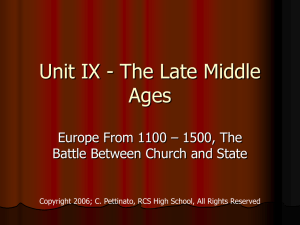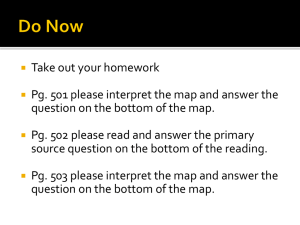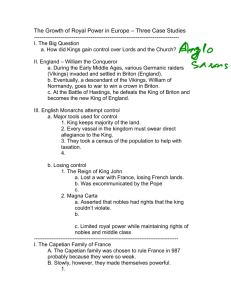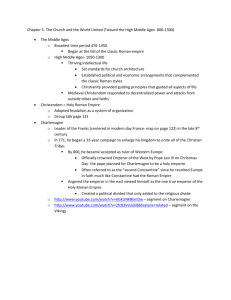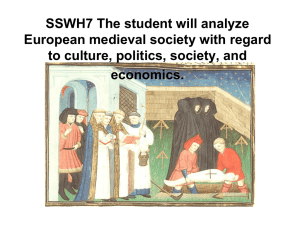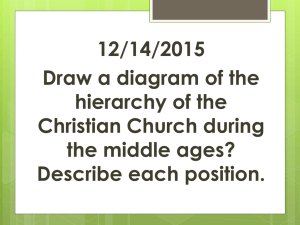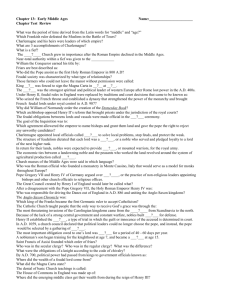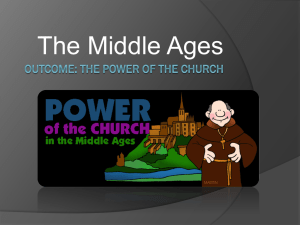Beginnings of European History
advertisement
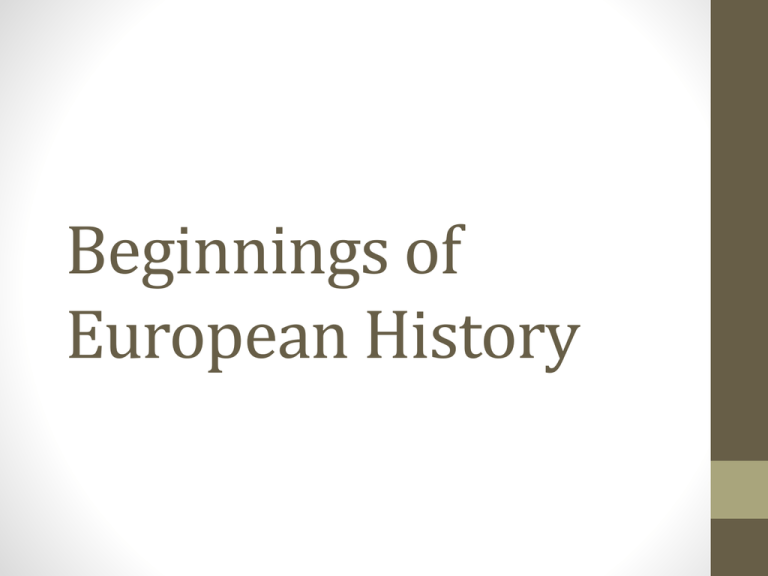
Beginnings of European History ROMAN EMPIRE Caesar Augustus • Octavian became Augustus (“revered one”), first Roman emperor Strengths of Empire • strong government • unifying law code that could be updated and interpreted • good trade and transportation (roads for army) • could become citizen by enlisting in the army Roman Society • a few rich people and many poor people • slaves were unnecessary due to cheap labor, but showed status • boys were taught in schools • Roman emperor was the head of the religion • gladiators were entertainment Technologies • Aqueducts • Galen’s medical knowledge • Ptolemy’s theory of astronomy (geocentric) CHRISTIANITY Christianity • A religion whose followers believe Jesus Christ to be the Savior of the world. Spread of Christianity Spread of Christianity Constantine • The first Roman Emperor to become Christian. • Issued the Edict of Milan in 313 • Founded a new capital at Constantinople Doctrine of Petrine Succession • Early Christian doctrine that the apostle Peter was the appointed successor of the Christian church • Used to justify Papal power (the power of the Pope) • Avoided caesaropapism- when a leader is the head of state and the head of the church Spread of Christianity Great Schism (1054) • Split between East and West • West= Roman Catholic East= Eastern Orthodox Spread of Christianity FALL OF ROME Diocletian • Roman emperor that split the empire into east and west • drove out barbarians • tried to impose wage and price controls Inflation • money loses its value while prices continue to rise • countries unstable because their international standing decreases (they can get less stuff) Decline of Rome • Germanic invaders (called barbarians) • lack of expansion (no additional flow of money) • political and military weakness • social change (apathy toward the government) Byzantine Empire • Became the richest part of the old Roman Empire • Trade limited to the Arabic World (Middle East and North Africa) • Cut off ties with the west • Famous emperor: Justinian I • Greek in culture and language ISLAM Islam • A religion whose followers adhere to the teachings of the prophet Mohammed. • Mohammed was visited by an angel (Gabriel) who restored the teachings of God to Earth. • Born in Mecca, he was driven out because of his teachings. • Later, he was invited back. • Translated into heaven in Jerusalem Five Pillars of Islam • The Creed (faith in Allah) • Pray five times a day • Fast during the month of Ramadan • Almsgiving • Pilgrimage to Mecca Islamic Division • After Mohammed died, there was controversy over who should take his place. • Those who favor his son-in-law Ali= Shia • Those who favor election= Sunnite Spread of Islam • Spread rapidly throughout the Middle East and North Africa. • Invaded Spain • Moors at Tours 732 Middle Ages What was Europe like? • Governments became more local • “mini Ice-Age” caused a decline in food production • People were not as healthy • Some learning was lost Middle Ages • A time between the Classical Period (Greece and Rome) and the Modern World (RenaissanceNow) Rise of the Frankish Empire • Franks came in contact with the Roman Empire in the 200s • 481- Clovis became king of a Frankish tribe • • • • He conquered other tribes in northern Gaul Converted to Christianity Controlled southwestern Gaul Started the Merovingian kings Charlemagne • Son of Pepin III • Rule 768-814 • Defeated many in war: • • • • Lombards (Italy) Saxons (northern Germany) Avars (central Europe) Spain in the Pyrenees • 800- crowned “Emperor of the Romans” by Pope Leo III Carolingian Renaissance • Emphasis on reading, writing, and education • Developed schools based on the Roman model • Alcuin of York taught Charlemagne’s children • Written Bible • Caroline miniscule • Bishops told to create libraries Charlemagne’s Reforms • Split up his empire into areas controlled by counts • Missi Dominici “the Lord’s messengers” • Ensured support of Charlemagne • Heard complaints • Determined effectiveness of laws Decline of the Frankish Empire • Charlemagne gave his empire to his son, Louis the Pious • 840- Louis divided the empire among his sons: Lothair, Charles the Bald, and Louis the German • 843- Treaty of Verdun • Split up Charlemagne’s empire • 870- Middle Kingdom split between the remaining two kingdoms • Empire weakened by invasion • Muslims • Slavs • Magyars Vikings • 800-900 ADfearsome invaders • From Scandinavia • Worshipped pagan gods • Raid and loot towns for slaves to work their farms • Good at warfare and siege techniques Magyars • • • • Hungarian tribes 7 tribes came together Pope sent a crown to St. Stephen to crown him as their king Thereafter, Hungarians came under the realm of Latin Christendom FEUDALISM How it worked • • • • A powerful noble had lots of land, more than he could use He granted this land (called a fief) to a lesser noble to use This created a contract between the two The lesser noble promised loyalty while the powerful noble promised protection • Land was inherited from father to eldest son (primogeniture) • Women could have land in their dowry, but it became their husband’s land when they got married The people • • • • Lord= grants land/expects loyalty Vassal= accepts land/protection Knights= trained soldiers that work for vassals (nobility) Peasants (Serfs)= people who live on the land and farm the land Manors • Self-sufficient villages where peasants worked the land for a noble • Noble kept 1/3 of the land for private use (domain) • Peasants had other 2/3 to work for their sustenance • Peasants also had to work on the noble’s land to pay for use of their land Nobles • Did not live in luxury • Often lived in a keep or a castle (later on) • Castles had thick walls for defense and small windows without glass • Marriage was a way to advance one’s fortunes • Men depended on their wife and children for help Peasants • Worked the land • Did not get vacations or holidays • Could not hunt on the Lord’s land • Peasants had a poor diet (rarely ate meat) • Victims of warfare TOWNS Rights of Townspeople • Established through a Town Charter- a document indicating the rights of townspeople • Rights (called corporate liberties) included: • Freedom • A year and a day rule • Exemption • Townspeople did not have to work on the manor • Town justice • Towns had their own courts • Commercial privileges • Townspeople could sell goods freely in the town market Guilds • A group of people with the same occupation that had the sole right to trade in a given area (monopoly) • Protected against competition from outsiders • Took care of members of the guild and their families • Craft guilds set standards for wages, hours, and working conditions • Controlled training of workers Life and Death • Serfs ran away to towns to improve their lives • some also went to find work after being forced to leave the manor • Towns were in easily defensible places • Towns were not very clean • Diseases spread rapidly Education • Mainly for nobles and clergy • Schools were monasteries and churches • Universitas- “association of people”, basically a guild for education • • • • University of Paris- theology University at Oxford- theology University of Bologna- civil law and church law University of Salerno- medicine Architecture • Mainly church architecture • 1000-1150= Romanesque • Heavy, domed roofs • Few windows • Little light • 1100-1300= Gothic • • • • • Tall spires Flying buttresses High, thin walls Lots of light Stained-glass windows Romanesque Gothic CHURCH Hierarchy Monasticism • Some people wanted to escape from the world and devote their life to God • Initially, monks and nuns lived alone and apart from the world • Eventually they built monasteries (for monks) and convents (for nuns) • Monasticism was the way of life in monasteries and convents Saints • Saint Benedict- became a hermit • Well-known for his holiness • Established a monastery at Monte Cassino in central Italy • The standards he set for monks was known as Benedictine Rule and was later adopted by other monasteries and convents • Saint Patrick • Brought Christianity to Ireland in 432 • Saint Augustine • Led a group of monks to England • Archbishop of Canterbury (center of Christian church in England) Church and Politics • Canon law- Church’s law code • Interdict- form of punishment where all churches in a region were closed and sacraments forbidden • Heretics- those who opposed the church • Threat to the church, heretics punished severely • Tithe- One tenth of a person’s income to be paid to the Church Society and Economics • • • • Encouraged equality and dignity for all Divorce was never allowed Took care of poor and needy Sometimes even established hospitals DECLINE OF CHURCH’S POWER Problems • Church gained great wealth and influence • Simony- people could buy church offices • Inquisition- search for heretics • Especially popular in Spain • Often involved torture of accused heretics Babylonian Captivity • Philip IV of France tried to tax the clergy • Pope Boniface VIII decreed this illegal • Philip IV had the pope arrested. • After Boniface died, Philip IV had a French pope elected • 1309- Clement V moved church headquarters to Avignon, France • 1377- Pope Gregory XI returned the papacy to Rome Great Schism • 1377- Pope Gregory XI returned the papacy to Rome • 1378- cardinals elected an Italian pope and then later a French pope • Italian pope stayed in Rome • French pope moved to Avignon • Council of Constance 1414-1417- ended the Great Schism • Elected a new Italian pope • Removed French and Italian popes • A third pope resigned Reformers • John Wycliffe- 1300s • Authority of Bible should be greater than the authority of popes • Individuals should be able to read and interpret scripture • English translation of Bible • Jan Hus • Czech religious reformer • Attacked the practices of worldly church clergy • Believed people should have a direct relationship with their God ENGLISH MONARCHY Norman Conquest • 1066- Duke William of Normandy claimed the English throne after Edward’s death • He crossed the English Channel and defeated a rival for the throne at the battle of Hastings • Resulted in the mixing of French and Anglo-Saxon culture • William rule from 1066-1087 After the Conquest • William brought feudalism to England and had the nobles swear loyalty to him • He also stopped the nobility from uniting by scattering their fiefs throughout England • 1100-1135- Henry I, sent traveling judges throughout England • 1154-1189- Henry II, allowed nobles to pay a fee instead of serving in the army, also advocated trial by jury • He married Eleanor of Aquitaine which gave him feudal lands in France King John • Son of Henry II • Wanted English nobles to pay more taxes to support wars in France • Nobles banded together to oppose this • Forced King John to sign the Magna Carta Magna Carta • • • • Latin for “Great Charter” Protected the liberties of the nobles Established rights for ordinary people King John could not raise taxes without consent of the Great Council • It made sure that the king obeyed the law like everyone else. Parliament • 1260s- revolt against Henry III threatened the monarchy • 1265- Simon de Montfort combined the nobles and the middle class against the king • This combination led to the English Parliament • House of Lords- nobles and clergy • House of Commons- knights and burgesses Common Law • 1272-1307- Edward I ruled England • Common law is based on precedence, how similar situations were handled in the past • Divided the courts into three parts: • Court of Common Pleas- ordinary citizens • Court of the Exchequer- financial accounts and tax cases • Court of the King’s Bench- king or government FRENCH MONARCHY Capetian Kings • • • • 987- Carolingian kings died out 987- Nobles chose Hugh Capet to be king Started the Capetian line that ruled for 300 years Capetians wanted more land, especially land owned by the English in France • 1180-1223- Philip II took large land holdings away from the English • 1285-1314- Philip IV (“the Fair”) started taxing the clergy Central Government • Despite centralizing measures, still very feudal in France • Nobles had most of the power • King was stronger than clergy in France • Dispute with Boniface the VII • Estates General- representative body made of the three major social classes in France (peasants, clergy, nobility) HUNDRED YEARS WAR Why? • English king Edward III held lands in France • He was a vassal of the French king • 1328- French Capetian king died • Edward III claimed the throne • French elected Philip VI to be king • War broke out Battles and Weapons • Battle of Agincourt (1415) • English used the longbow to cut down French knights • Orleans • Siege led by Joan of Arc • Weapons • Cannons • Gunpowder • Longbows Joan of Arc • A peasant girl that helped France unite to defeat the English • French royal family was at war • House of Burgundy sided with the British • House of Orleans tried to unite France • Joan of Arc helped secure the throne for Charles VII of Orleans • After her capture and trial, she was burned at the stake for unwomanly conduct Results • French won the war, but France was deeply hurt • Kings in France and England gained more power over nobles • English kings had power limited further by the law War of the Roses • 1455- a war between the English houses of Lancaster (red rose) and York (white rose) • 1485- Henry Tudor of the House of Lancaster defeated King Richard III of York • He became Henry VII HOLY ROMAN EMPIRE What does it look like? Rulers • 814- Italy fell into disorder after Charlemagne’s death • 900- Italy was held by the Byzantine Empire, the Church, and Arab Muslims • 936- German lords elect Otto I as king • 951- He attacked northern Italy • 962-He became the new “Holy Roman Emperor” • 1054-1056- Henry III, height of imperial power • 1056- Henry IV came to power CONFLICTS WITH THE CHURCH Henry IV • Henry IV clashed with Pope Gregory VII • Lay investiture- nobles appointed bishops • Gregory VII excommunicated Henry IV and told the nobles to elect another emperor • 1077- Henry pleaded for the pope’s mercy • 1122- Concordat of Worms solved the controversy of lay investiture • Only the pope could appoint bishops • Emperor could give bishops fiefs CRUSADES Why? • 1000s- Seljug Turks took control of Palestine • Turks threatened Constantinople and the king asked the pope for help • 1095- Pope Urban II called a meeting and urged European nobles to send knights to regain the Holy Land • People went because: • Promise of salvation • Hope to gain land or wealth • Opportunities for trade First Crusade • 1096-1099- French and Italian lords sent several armies to the Holy Land • Captured Antioch and eventually Jerusalem • The Crusaders slaughtered Jerusalem’s Muslim and Jewish inhabitants Other Major Crusades • Second Crusade- 1147-1149- Turks had taken back some cities gained in the First Crusade • Turks held, Crusaders lost • Third Crusade- Saladin (Turk) gained control of Jerusalem • 1189-1192- Frederick Barbarossa, King Philip II of France, and King Richard I of England went to capture the Holy Land • King Richard I secured a truce with Saladin that allowed Christians to enter Jerusalem freely Children’s Crusade • 1212- young people from across Europe decided to march to the Holy Land • By the time they reached the Mediterranean coast, they were disorganized and hungry • Several thousand boarded ships in France that sold them into slavery Results • New weapons and warfare • The crossbow • Catapults • Political change • Some lords sold land to go on the Crusades • Fewer lords=more power with fewer people • Better trade with the Middle East and beyond BLACK DEATH Black Death • A.k.a. “Bubonic Plague” or the “Black Plague” • 1347- plague came from Asia and spread along trade routes • Black rats on ships carried the disease • Fleas bit rats and then bit humans • High mortality rate • About 25 million people died between 1347-1351 • 1/3 the population of Europe Results of the Black Death • • • • • People lost faith in God Church lost power and importance Workers became more valuable and asked for higher wages Peasant uprisings Change in relations between the upper and lower class
